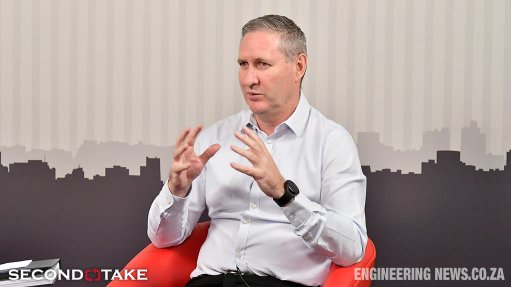Climate change will hit Africa much harder than other continents – panel

A panel of experts explain why Africa has been and will be hit hardest by climate change going forward
A panel of speakers participating in consultancy Deloitte's Africa Outlook 2020 event, on Thursday, highlighted the economic and social themes that are expected to feature prominently on the continent this year, including climate change, which is anticipated to hit Africa the hardest.
Deloitte emerging markets and Africa MD Dr Martyn Davies said Africa’s population would reach 1.5-billion people by 2030, with most of the population vulnerable to severe floods, water scarcity, droughts and rising temperatures.
He noted that temperatures in Africa were increasing at one-and-a-half times the rate of global temperatures.
Insurance company Munich Re of Africa CEO Nico Conradie pointed out that 820 catastrophes had been recorded globally in 2019, resulting in $156-billion in recovery costs, while only a third of that amount was insured. He said these losses as a result of natural disasters were carried by both corporates and individuals.
He said the effects of global warming were apparent in South Africa when looking at the rising temperatures. “Of the last 20 years, 18 had been classified as the warmest years on record, while sea levels are also rising by about 300 mm a year globally."
University of the Witwatersrand Global Change Institute Professor Francois Engelbrecht highlighted that Africa contributes 4% of global emissions, but is also the most vulnerable to climate change impacts, owing to a unique climate system, existing dry and warm conditions and because it is underdeveloped.
He said Africa also has a low adaptive capacity. The US evacuates people outside the path of a natural disaster days before it hits; however, African countries do not have adequate transport systems to evacuate people quickly, nor do its coasts have sea walls.
Engelbrecht further said the climate change problem in Africa was often worse than reported by media houses across the continent.
For example, Cyclone Idai had been the biggest flood disaster in the history of Southern Africa, as well as the second-biggest flood disaster ever recorded in the southern hemisphere, and yet “we read little from media houses on that storm”, he pointed out.
He added that Africa was on the verge of reaching tipping points, including the increased likelihood of day zero events in large cities – where cities run out of potable water – and heatwave occurrences.
“Business and government strategies around climate change is currently reactive in most African countries, where it should rather pursue transformative adaptation – preparing in the first place for unprecedented damage to economies. South Africa, in particular, is increasingly likely to see tropical cyclones hit over the coastline of Maputo or Richards Bay, but we are unprepared.
“Additionally, African countries have not strategised around the risk of stranded assets. More countries on the continent are discovering oilfields around its coasts, with Ghana due to develop its first refinery soon, but there is a real risk of stranded assets 50 years from now, owing to the world moving away from fossil fuels,” Engelbrecht explained.
HUMAN RIGHTS EROSION
Amnesty International Southern Africa regional director Deprose Muchena averred that climate change was the biggest intergenerational human rights violation of our time.
He noted that Africa already struggled with high levels of inequality and that children were now also being faced with threats to their health and wellbeing as a result of climate change.
“If we do not size up and rise up to see climate change as a direct threat to human rights, especially considering the increasing scarcity of water, we will have masses of violations in populations.
“Seventy-million were displaced in 2019, compared with 65-million people displaced in 2018. If you then factor in climate migration, the consequences are catastrophic because governments do not respond quick enough to these moves.”
Muchena said businesses often lacked the imagination to rethink business models and were “lazy” to come up with climate adaptable technologies to make communities more resilient.
Comments
Press Office
Announcements
What's On
Subscribe to improve your user experience...
Option 1 (equivalent of R125 a month):
Receive a weekly copy of Creamer Media's Engineering News & Mining Weekly magazine
(print copy for those in South Africa and e-magazine for those outside of South Africa)
Receive daily email newsletters
Access to full search results
Access archive of magazine back copies
Access to Projects in Progress
Access to ONE Research Report of your choice in PDF format
Option 2 (equivalent of R375 a month):
All benefits from Option 1
PLUS
Access to Creamer Media's Research Channel Africa for ALL Research Reports, in PDF format, on various industrial and mining sectors
including Electricity; Water; Energy Transition; Hydrogen; Roads, Rail and Ports; Coal; Gold; Platinum; Battery Metals; etc.
Already a subscriber?
Forgotten your password?
Receive weekly copy of Creamer Media's Engineering News & Mining Weekly magazine (print copy for those in South Africa and e-magazine for those outside of South Africa)
➕
Recieve daily email newsletters
➕
Access to full search results
➕
Access archive of magazine back copies
➕
Access to Projects in Progress
➕
Access to ONE Research Report of your choice in PDF format
RESEARCH CHANNEL AFRICA
R4500 (equivalent of R375 a month)
SUBSCRIBEAll benefits from Option 1
➕
Access to Creamer Media's Research Channel Africa for ALL Research Reports on various industrial and mining sectors, in PDF format, including on:
Electricity
➕
Water
➕
Energy Transition
➕
Hydrogen
➕
Roads, Rail and Ports
➕
Coal
➕
Gold
➕
Platinum
➕
Battery Metals
➕
etc.
Receive all benefits from Option 1 or Option 2 delivered to numerous people at your company
➕
Multiple User names and Passwords for simultaneous log-ins
➕
Intranet integration access to all in your organisation

















